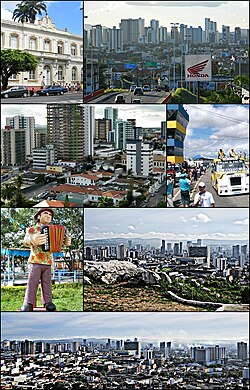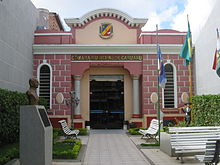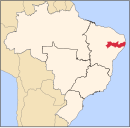Caruaru Cidade de Caruaru | |
|---|---|
City | |
| City of Caruaru | |
 | |
| Coordinates: 08°16′58″S35°58′33″W / 8.28278°S 35.97583°W | |
| Country | |
| Region | Northeast |
| State | |
| Founded | 1849 |
| Government | |
| • Mayor | Raquel Lyra (PSDB) |
| Area | |
• Total | 920.61 km2 (355.45 sq mi) |
| Elevation | 545 m (1,788 ft) |
| Population (2024 [1] ) | |
• Total | 402,290 |
| • Density | 440/km2 (1,100/sq mi) |
| Time zone | UTC-3 (Brasília Time) |
| Postal code | 55000-000 |
| Area code | +55 81 |
| HDI (2024) | 0.790 – medium |
| Website | www |
Caruaru is a Brazilian municipality in the state of Pernambuco. The most populous city in the interior of the state, Caruaru is located in the microzone of Agreste and because of its cultural importance, it is nicknamed Capital do Agreste (Portuguese for the "capital city of the Agreste region"), Princesinha do Agreste ("Little Princess of Agreste"), and Capital of agreste ("the capital city of forró ").
Contents
- History
- Geography
- Economy
- Economic Indicators
- Health Indicators
- Transports
- Culture
- Festa Junina
- Sports
- Tourism
- Sister cities
- See also
- References
- External links
The city is located 140 kilometers (87 miles) from the state capital of Recife, which has an international airport. However, Caruaru has its own airport. Caruaru is renowned for its extensive Festival de São João ("Saint John's Festival"), which takes up the whole month of June, sometimes extending into July. Caruaru had a 2024 resident population of 402,290 inhabitants, living in a land area of 920.61 square kilometers (355.45 square miles).
Caruaru is the hometown, among others, of Álvaro Lins, Brazilian journalist, and Lieutenant Brigadier Reginaldo dos Santos, former dean of the Brazilian Technological Institute for Aeronautics.








